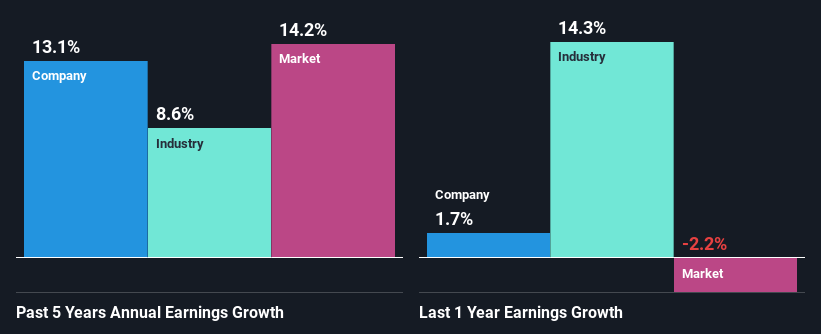Willis Towers Watson Public Limited Company's (NASDAQ:WTW) Stock Been Rising: Are Strong Financials Guiding The Market?
Willis Towers Watson's (NASDAQ:WTW) stock up by 4.7% over the past three months. Given that the market rewards strong financials in the long-term, we wonder if that is the case in this instance. Particularly, we will be paying attention to Willis Towers Watson's ROE today.
ROE or return on equity is a useful tool to assess how effectively a company can generate returns on the investment it received from its shareholders. In other words, it is a profitability ratio which measures the rate of return on the capital provided by the company's shareholders.
Check out our latest analysis for Willis Towers Watson
How Is ROE Calculated?
The formula for return on equity is:
Return on Equity = Net Profit (from continuing operations) ÷ Shareholders' Equity
So, based on the above formula, the ROE for Willis Towers Watson is:
11% = US$1.0b ÷ US$9.5b (Based on the trailing twelve months to September 2023).
The 'return' is the yearly profit. So, this means that for every $1 of its shareholder's investments, the company generates a profit of $0.11.
What Is The Relationship Between ROE And Earnings Growth?
We have already established that ROE serves as an efficient profit-generating gauge for a company's future earnings. Based on how much of its profits the company chooses to reinvest or "retain", we are then able to evaluate a company's future ability to generate profits. Assuming everything else remains unchanged, the higher the ROE and profit retention, the higher the growth rate of a company compared to companies that don't necessarily bear these characteristics.
Willis Towers Watson's Earnings Growth And 11% ROE
To start with, Willis Towers Watson's ROE looks acceptable. Even so, when compared with the average industry ROE of 14%, we aren't very excited. Although, we can see that Willis Towers Watson saw a modest net income growth of 13% over the past five years. We reckon that there could be other factors at play here. For example, it is possible that the company's management has made some good strategic decisions, or that the company has a low payout ratio. Bear in mind, the company does have a respectable level of ROE. It is just that the industry ROE is higher. So this also provides some context to the earnings growth seen by the company.
Next, on comparing with the industry net income growth, we found that Willis Towers Watson's growth is quite high when compared to the industry average growth of 8.6% in the same period, which is great to see.
Earnings growth is a huge factor in stock valuation. It’s important for an investor to know whether the market has priced in the company's expected earnings growth (or decline). Doing so will help them establish if the stock's future looks promising or ominous. Is Willis Towers Watson fairly valued compared to other companies? These 3 valuation measures might help you decide.
Is Willis Towers Watson Making Efficient Use Of Its Profits?
Willis Towers Watson has a healthy combination of a moderate three-year median payout ratio of 33% (or a retention ratio of 67%) and a respectable amount of growth in earnings as we saw above, meaning that the company has been making efficient use of its profits.
Moreover, Willis Towers Watson is determined to keep sharing its profits with shareholders which we infer from its long history of paying a dividend for at least ten years. Our latest analyst data shows that the future payout ratio of the company is expected to drop to 4.5% over the next three years. As a result, the expected drop in Willis Towers Watson's payout ratio explains the anticipated rise in the company's future ROE to 18%, over the same period.
Summary
In total, we are pretty happy with Willis Towers Watson's performance. In particular, it's great to see that the company has seen significant growth in its earnings backed by a respectable ROE and a high reinvestment rate. The latest industry analyst forecasts show that the company is expected to maintain its current growth rate. Are these analysts expectations based on the broad expectations for the industry, or on the company's fundamentals? Click here to be taken to our analyst's forecasts page for the company.
Have feedback on this article? Concerned about the content? Get in touch with us directly. Alternatively, email editorial-team (at) simplywallst.com.
This article by Simply Wall St is general in nature. We provide commentary based on historical data and analyst forecasts only using an unbiased methodology and our articles are not intended to be financial advice. It does not constitute a recommendation to buy or sell any stock, and does not take account of your objectives, or your financial situation. We aim to bring you long-term focused analysis driven by fundamental data. Note that our analysis may not factor in the latest price-sensitive company announcements or qualitative material. Simply Wall St has no position in any stocks mentioned.

